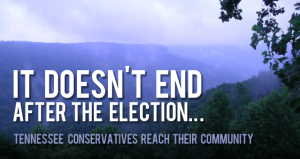Blog
It Doesn’t End After the Election: Tennessee Conservatives Reach Their Community
March 13, 2013
Aretie Patterson and her local tea party hit the streets in Cumberland County, Tennessee last fall, knocking on doors, speaking with voters, and following up with post cards.
“It goes beyond waving signs and robo calls.” Patterson says. “Making a real difference means knocking on doors, developing relationships with people, and reaching people on a personal level.”
Unlike many conservative activists, Aretie Patterson has been involved in politics since grade school. “In grade school we had elections for class officers. I ran for several of those, and in high school, I was elected Secretary of my school’s Student Council,” Patterson says.
Growing up, Patterson followed current events faithfully. “My father was a naturalized citizen who was passionate about voting and being informed on the political issues of the day,” Patterson says. “We always had newspapers and news magazines in the house and my father and I would have long—and sometimes intense—discussions about what I read.”
Patterson carried her interest in politics with her into college, where she double-majored in Political Science and Psychology, with a minor in History. After graduation, Patterson taught U.S. Government in Virginia. “Every day we discussed the belief system upon which republican forms of government are premised.”
After retiring and moving down to Tennessee, Patterson took the next step of involvement—she got involved in her local tea party. Patterson campaigned during the mid-term elections in 2010 with the Cumberland County Tea Party. And in 2011, Patterson attended her first of two American Majority trainings—a Grassroots Activist Training session.
“What I learned from this blew my mind,” Patterson says. “I learned about the importance of getting out the vote through precinct work and door knocking. It takes about six conversations with a voter to change their minds on an issue or candidate.” Patterson says she left with a good understanding of  what to do and how to do it. “I could see the right was way behind and we needed to change how we did campaigns. It does not end after the election. We need to build a consistent grassroots network.”
what to do and how to do it. “I could see the right was way behind and we needed to change how we did campaigns. It does not end after the election. We need to build a consistent grassroots network.”
Though Patterson says the election results in 2012 were discouraging, she plans to soldier on, and is already making plans for the 2014 midterm elections. “I want to work with local conservatives to find real conservative candidates who can win elections,” she says.
Patterson says it’s very important for people who want to get involved to get informed first. “Get every bit of American Majority training that you can. Learn how to deal with the press; learn how to handle interviews, so that you do not say dumb things that are going to torpedo your campaign and chances of winning the election.”
Patterson says she plans to attend more American Majority trainings in the future, and enjoys using the website as well. “The blogs and videos can be so helpful,” Patterson says. She says she will continue to stay involved as much as possible. “I plan to use my training to support and advance the election of conservatives at all levels of government and to support and advance Conservative values in the political arena.”
